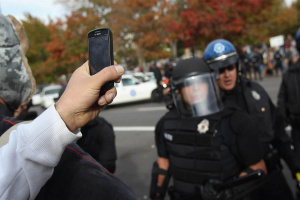 To paraphrase Stevie Wonder, “I am amazed but not amused” by the current contention that the “Youtube Effect” is partially to blame for the spike in violent crime that some cities are experiencing this year. The notion—that cops are purposefully backing down from doing their job because they’re afraid of the consequences if they’re caught on video—was even offered up by James Comey, the FBI Director, last month in a speech at the University of Chicago’s law school. “In today’s YouTube world,” he said, “there are officers reluctant to get out of their cars and do the work that controls violent crime.”
To paraphrase Stevie Wonder, “I am amazed but not amused” by the current contention that the “Youtube Effect” is partially to blame for the spike in violent crime that some cities are experiencing this year. The notion—that cops are purposefully backing down from doing their job because they’re afraid of the consequences if they’re caught on video—was even offered up by James Comey, the FBI Director, last month in a speech at the University of Chicago’s law school. “In today’s YouTube world,” he said, “there are officers reluctant to get out of their cars and do the work that controls violent crime.”
There are many troubling aspects to this argument, but what it says about scrutiny and transparency is applicable to the broad effort to improve performance in the public sector.
Scrutiny, in an age when virtually everyone is walking around with a pocket-sized, high-quality video camera, is just inevitable. But it’s a fallacy to say that examination of the way one works necessarily creates pressure to avoid work; that the discomfort of being “put under the microscope” is so mortifying that performance will drop when it’s applied.
If you are good at your job, scrutiny should pose no threat to you. There is plenty of evidence of this in professional sports where the undeniably best athletes in the world continually review game tape and video of practices to find aspects of their performance that they can improve. Instant replay didn’t do anything to reduce the level of play on the field, court or ice.
And if you want to get better at your job, regardless of how good you currently are, you should also welcome scrutiny. This is the process that doctors and mental health clinicians use in their profession, it is the message we are now delivering to teachers, and it should apply to cops as well. Continuous improvement requires scrutiny.
Which is where transparency comes in. Snippets of video taken by bystanders should not be substituted for start-to-finish recordings of encounters, but in the absence of more comprehensive and systematically recorded evidence, that is what the public is left with.
The impulse to reach for the camera is not just because it’s so convenient. Bad policing and the resulting investigation of it—if and when it ever happens—is hidden away from most of us. Police departments typically investigate themselves, and very rarely do they willingly divulge the details of those investigations. Such secretiveness only increases distrust.
People taking videos in public, of public officials who are in the act of doing their publicly-funded jobs on our behalf should not be viewed negatively. Public officials should read those acts as their constituents’ desperate demand for performance information.

Leave a Reply
The comments are closed.